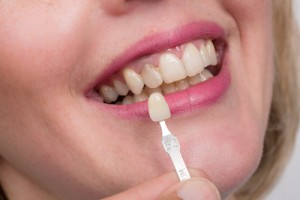Common Dental Crown Problems and Solutions
 Dental crowns are meant to be the final step in the tooth restoration process, but poorly installed crowns can cause pain, sensitivity, and other complications. If you’re experiencing issues with a dental crown, let Dr. Evanson know right away. In the meantime, here’s a more in-depth look at common dental crown problems and their solutions.
Dental crowns are meant to be the final step in the tooth restoration process, but poorly installed crowns can cause pain, sensitivity, and other complications. If you’re experiencing issues with a dental crown, let Dr. Evanson know right away. In the meantime, here’s a more in-depth look at common dental crown problems and their solutions.
Sensitivity to Hot and Cold
In the days after having a crown put on, you may notice the tooth is thermally sensitive right at the edge of the gum line. This can happen when the enamel is trimmed away as part of the crowning process, and the dentin underneath is exposed. If the crown doesn’t cover the tooth quite as fully as it should, even on a microscopic scale, a potentially sensitive dentin surface could become exposed.
You have two easy fixes for this problem that don’t involve removing the crown. You can either choose toothpaste designed for sensitive teeth or have Dr. Evanson apply a solution to the crowned tooth that protects the tiny area of exposed dentin from temperature changes.
General Tooth Pain
Inflammation of a crowned tooth’s pulp may be trigged by the trauma of having the tooth trimmed for a dental crown fitting. Usually, the swelling is temporary, and the pulp returns to normal on its own. In the meantime, you can take over-the-counter non-steroidal anti-inflammatory (NSAID) medication to lessen the pain and inflammation.
If your toothache lingers even after several days of taking NSAIDs, you may need a root canal to reverse the pain.
Gum Tissue Pain
To avoid issues with thermal sensitivity, crowns usually end right at or just below the gum line. Therefore, it’s easy for the gums to get roughed up during the tooth-trimming, impression-taking, and crown-fitting processes.
In most cases, gum pain subsides after a few days when the inflammation goes down. To speed up the healing process, take NSAIDs and rinse with warm salt water up to three times per day.
Nerve Problems
Every tooth has a soft core called the pulp. This is where your tooth’s nerves are located. Getting a crown installed to repair a fractured or decayed tooth sometimes traumatizes the nerves. The resulting discomfort ranges from mild tenderness to excruciating pain, which may be caused by biting down or exposure to hot and cold temperatures. You might notice symptoms of nerve problems shortly after having the crown put on or even months after the procedure.
Usually, the solution is to give the tooth a root canal and put on a new crown.
Bite Issues
During a fitting, your dentist evaluates how the crown connects with your other teeth before cementing it into place. Despite this careful attention to detail, you may notice that the crown isn’t exactly the right shape once the numbness wears off. Initially, this may be a mere annoyance, but as you put excess pressure on your tooth again and again, it may become traumatized and begin to hurt. It’s also possible for an infection to form under the crown months or years after having it put on, which may cause inflammation and a misaligned bite as a result.
If an improperly shaped crown is to blame for your bite issues, an easy fix is to make a quick trip to the dentist for reshaping. An infection may require a root canal procedure and a new crown.
Cracked Root
If you bite down too hard on a crowned tooth, the root may crack. Usually, crowns are an effective treatment option for cracked teeth, but the root is beyond the crown’s reach.
Unfortunately, in the case of a cracked root, there’s no other solution but to extract the tooth.
Contact Dr. Evanson if You Have Dental Crown Problems
If you recently had a crown put on at Evanson DDS, and now you’re experiencing a problem, we want to make it right. The information here is useful for helping you know what dental crown problems might be causing you pain, but there’s no substitute for a professional diagnosis and treatment at our office.
To discuss your problems with Dr. Evanson, or to schedule an appointment to have your dental crown fixed, please call our Parker office today at (720) 409-0008.
Leave a reply →





